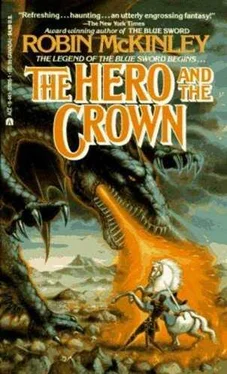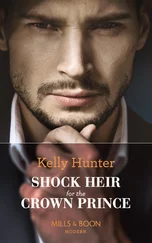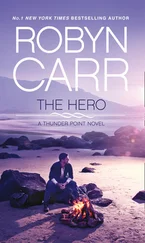Then Talat thumped into the dragon’s side with both hind feet, and the force of the blow lifted them both—for the dragon’s claws were tangled in leather laces—and dropped them heavily. The dragon coughed, but there was no fire; and Aerin had fallen half on top of the thing. It raked her with its spiked tail, and something else tore; and its teeth snapped together inches from her face. Her sword was too long; she could not get it close enough for stabbing, and her shoulder was tiring. She dropped the sword and struggled to reach her right boot top, where she had a short dagger, but the dragon rolled, and she could not reach it.
Then Talat was there again, and he bit the dragon above its small red eye, where the ear hole was; and the dragon twisted its neck to spout fire at him, but it was still dazed by its fall, and only a little fire came out of its mouth. Talat plunged his own face into the trickle of smoke and seized the dragon by the nostrils and dragged its head back; and still farther back. Its forefeet and breast came clear of the ground, and as the dragon thrashed, Aerin’s leg came free, and she pulled the dagger from her boot and thrust it into the dragon’s scaleless breast. The dragon shrieked, the noise muffled by Talat’s grip on its nose, and Aerin stumbled away to pick up her sword.
Talat swung the dying dragon back and forth, and slashed at its body with one forefoot, and the muscles of his heavy stallion’s neck ran with sweat and smudges of ash. Aerin lifted up the sword and sliced the dragon’s belly open, and it convulsed once, shuddered, and died. Talat dropped the body and stood with his head down, shivering, and Aerin realized what she had done, and how little she had known about what it would involve, and how near she had come to failure; and her stomach rebelled, and she lost what remained of her breakfast over the smoking mutilated corpse of the second dragon.
She walked a few steps away till she came to a tree, and with her hands on its bole she felt her way to the ground, and sat with her knees drawn up and her head between them for a few minutes. Her head began to clear, and her breathing slowed, and as she looked up and blinked vaguely at the leaves overhead, she heard Talat’s hoofbeats behind her. She put out a hand, and he put his bloody nose into it, and so they remained for several heartbeats more, and then Aerin sighed and stood up. “Even dragons need water. Let’s look for a stream.”
Again they were lucky, for there was one close at hand. Aerin carefully washed Talat’s face, and discovered that most of the blood was dragon’s, although his forelock was singed half away. “And to think I almost didn’t bother to put any kenet on your head,” she murmured. “I thought it was going to be so easy.” She pulled Talat’s saddle off to give him a proper bath, after which he climbed the bank and found a nice scratchy bit of dirt and rolled vigorously, and stood up again mud-colored. “Oh dear,” said Aerin. She splashed water on her face and hands and then abruptly pulled off all her dragon-tainted clothing and submerged. She came up again when she needed to breathe, chased Talat back into the water to wash the mud off, and then brushed and rubbed him hard till she was warm and dry with the work and he was at least no more than damp.
She dressed slowly and with reluctance, and they returned to the battlefield. She tried to remember what else she ought to have thought of about dragons. Eggs? Well, if there were eggs, they’d die, for new-hatched dragons depended on their parents for several months. And if there were young dragons, surely we’d have seen them—?
With much greater reluctance she tied together some dry brush and set fire to it from her tinder box, and approached the dark foul-smelling hole in the rock. She had to stoop to get inside the cave at all, and her torch guttered and tried to go out. She had an impression of a shallow cave with irregular walls of rock and dirt, and a pebbly floor; but she could not bear the smell, or the knowledge that the grisly creatures she had just killed had lived here, and she jerked back outside into the sunlight again, and dropped her torch, and stamped out the fire. She didn’t think there were any eggs, or dragon kits. She’d have to hope there weren’t.
She thought: I have to take the heads with me. The hunters always bring the heads—and it does prove it without a lot of talking about it. I don’t think I can talk about it. So she picked up her sword again and whacked off the second dragon’s head, and then washed her sword and dagger in the stream, re-sheathed them, and tied her spear behind the saddle. The dragons looked small now, motionless and headless, little bigger and no more dangerous than rabbits; and the ugly heads, with the long noses and sharp teeth, looked false, like masks in a monster-play for the children during one of the City holidays, where part of the fun is to be frightened—but not very much. Who could be frightened of a dragon?
I could, she thought.
She tied the heads in the heavy cloth she’d carried her leather suit in, and mounted Talat, and they went slowly back to the village.
The villagers were all waiting, over a hundred of them, gathered at the edge of town; the fields beyond the village were empty, and men and women in their working clothes, looking odd in their idleness, all stood watching the path Aerin and Talat had disappeared down only an hour ago. A murmur arose as the front rank caught sight of them, and Talat raised his head and arched his neck, for he remembered how it should be, coming home from battle and bearing news of victory. The people pressed forward, and as Talat came out of the trees they surrounded him, looking up at Aerin: Just the one girl and her fine horse, surely they have not faced the dragon, for they are uninjured; and they were embarrassed to hope for a sol’s burns, but they wished so sorely for the end of the dragon.
“Lady?” one man said hesitantly. “Did you meet the dragon?”
Aerin realized that their silence was uncertainty; she had suddenly feared that they would not accept even the gift of dragon-slaying from the daughter of a witchwoman, and she smiled in relief, and the villagers smiled back at her, wonderingly. “Yes, I met your dragon; and its mate.” She reached behind her and pulled at the cloth that held the heads, and the heads fell to the ground; one rolled, and the villagers scattered before it as if it still had some power to do them harm. Then they laughed a little sheepishly at themselves; and then everyone turned as the boy who had announced Aerin’s arrival said, “Look!”
Seven horsemen were riding into the village as Aerin had ridden in. “You weren’t supposed to get here till tomorrow,” she murmured, for she recognized Gebeth and Mik and Orin, who were cousins of hers a few times removed and members of her father’s court, and four of their men. Gebeth and Orin had been on many dragon hunts before; they were loyal and reliable, and did not consider dragon-hunting beneath them, for it was a thing that needed to be done, and a service they could do for their king.
“Aerin-sol,” said Gebeth; his voice was surprised, respectful—for her father’s sake, not hers—and disapproving. He would not scold her in front of the villagers, but he would certainly give Arlbeth a highly colored tale later on.
“Gebeth,” she said. She watched with a certain ironic pleasure as he tried to think of a way to ask her what she was doing here; and then Orin, behind him, said something, and pointed to the ground where the small dragons’ heads lay in the dust. Gebeth dropped his gaze from the unwelcome sight of his sovereign’s young daughter rigged out like a soldier boy
, who has seen better days, realized what he was looking at, and yanked his eyes up again to stare disbelievingly at red-hatred Aerin in her torn leather suit.
Читать дальше












